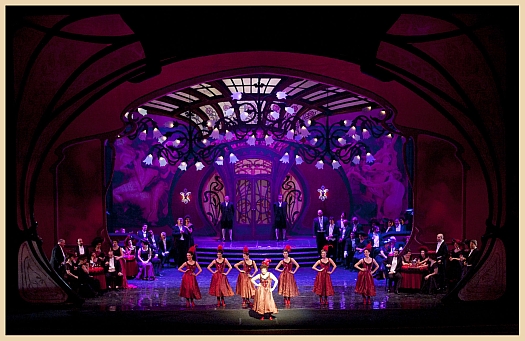 Argentina Lehár, The Merry Widow: Soloists and Orchestra of Teatro Colón, Gregor Bühl (conductor), Teatro Colón, Buenos Aires. 2.12.2011. (JSJ)
Argentina Lehár, The Merry Widow: Soloists and Orchestra of Teatro Colón, Gregor Bühl (conductor), Teatro Colón, Buenos Aires. 2.12.2011. (JSJ)
Production:
Direction: Candace Evans
Sets: Michael Yeargan
Costumes: Mini Zuccheri
Lighting: Roberto Traferri
Chorus: Peter Burian
Choreography: Rodolfo Lastra
Cast:
Hanna Glawari: Solveig Kringelborn / Leonora Del Río
Count Danilo: Mathias Hausmann / Luciano Garay
Valencienne: Lyuba Petrova / Natacha Tupin
Camile de Rosillon: Benjamin Bruns / Carlos Natale
Mirko Zeta: Reinhard Dorn / Gustavo Gibert
Viscount Cascada: Norberto Marcos
Raoul de Saint Brioche: Carlos Ullán
Bogdanovitch: Ernesto Bauer
Silviana: Natalia Lemercier
Kromow: Alejandro Meerapfel
Olga: Oriana Favaro
Pritschitsch: Leonardo Estévez
Praskowia: Rosmarie Klinghenhage
Njegus: Gustavo Zahnstecher
Zozó: Marisú Pavón
Lolo: Mariana Crespo
Dodo: Silvia Grün
Jou-Jou: Laura Beccaceci
Frou-Frou: María Laura Domingo
Co-Co: Graciela Bertotti
Margot: Marta Desperés
Maître: Ariel Ramos

After what has been a fairly “heavy” year at the Teatro Colón, the closing choice of The Merry Widow made for some lighter viewing in a production that appeared to be new – the hand program wasn’t specific – but using the scenery from the last production in 2001.
This, by the American scenographer Michael Yeagan, sets the work very much in the era it is intended – the Belle Époque, with its opulence and splendour and way of life that was to soon disappear with the world wars of the 20th century – and this was further reinforced with the dress and lighting.
But unlike that 2001 production, with its cast including Frederica von Stade and Thomas Allen, this edition’s seemed somewhat less grand. In the title role, Norwegian soprano Solveig Kringelborn was a charming and “merry” widow visually but vocally she came across as uneven and with a wide vibrato.
Equally the Russian soprano Lyuba Petrova as Valencienne lacked the necessary power, although she was more even and sang with fluency.
In general the male cast were more successful, with the Austrian Mathias Hausmann a convincing Danilo, and Benjamin Bruns an ardent Camile, while Reinhard Dorn made the most of his Mirko Zeta. Likewise the smaller parts were generally well played.
In addition to the soloists both the chorus and dancers have important roles and both played their parts well, all under the tasteful conducting of German Gregor Bühl.
Jonathan Spencer Jones